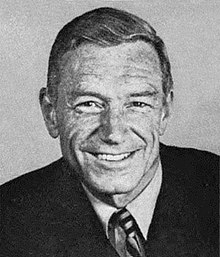Samuel S. Stratton | |
|---|---|
 Stratton in 1975 | |
| Member of the U.S. House of Representatives from New York | |
| In office January 3, 1959 – January 3, 1989 | |
| Preceded by | Bernard W. Kearney |
| Succeeded by | Michael McNulty |
| Constituency | 32nd district (1959–63) 35th district (1963–71) 29th district (1971–73) 28th district (1973–83) 23rd district (1983–89) |
| Mayor of Schenectady, New York | |
| In office 1956–1959 | |
| Preceded by | Archibald Wemple |
| Succeeded by | Kenneth S. Sheldon |
| Personal details | |
| Born | September 27, 1916 Yonkers, New York, U.S. |
| Died | September 13, 1990 (aged 73) Gaithersburg, Maryland, U.S. |
| Resting place | Arlington National Cemetery |
| Political party | Democratic |
| Children | 5; including Brian |
| Alma mater | University of Rochester Haverford College Harvard University |
| Military service | |
| Allegiance | |
| Branch/service | |
| Years of service | 1942–1946, 1951–1953 (Navy) 1946–1951, 1953–1976 (Navy Reserve) |
| Rank | |
| Battles/wars | World War II Korean War |
| Awards | |
Samuel Studdiford Stratton (September 27, 1916 – September 13, 1990) was an American politician who was a member of the Democratic Party. He is notable for his service as Mayor of Schenectady, and his 30-year career as a member of the United States House of Representatives from New York.
Born in Yonkers, New York as the son of a Presbyterian clergyman, Stratton was a graduate of the University of Rochester, Haverford College, and Harvard University. He worked for two years on the staff of a Massachusetts Congressman, and then served in the United States Navy during World War II. After the war, he worked as an on-air personality for television and radio stations in Schenectady, and served on the city council. He was recalled to active military duty for the Korean War, and served in Washington, DC. he remained in the Navy Reserve until retiring at age 60 with the rank of captain.
After returning to Schenectady, he was re-elected to the city council in 1953. In 1955 he was elected mayor. In 1958, Stratton ran successfully for Congress; he was reelected fourteen times, and served from 1959 to 1989. After unsuccessful attempts to run for higher office and surviving efforts by the New York State Legislature to remove him through unfavorable redistricting, Stratton settled into a long career as a senior member of the Armed Services Committee. In addition to paying attention to local defense concerns, including manufacturing contracts for General Electric and the Watervliet Arsenal, Stratton took a lead role on other military-related issues, including admitting women to the service academies.
Stratton abandoned his last reelection campaign in 1988 because of health issues, and retired to his home in Maryland. He died in Maryland in 1990, and was buried at Arlington National Cemetery.